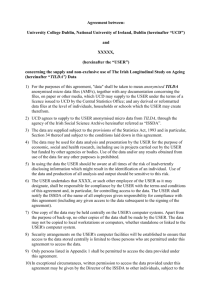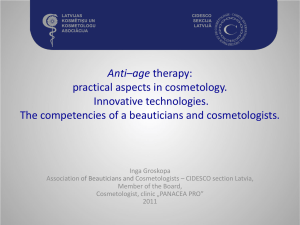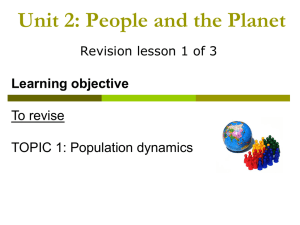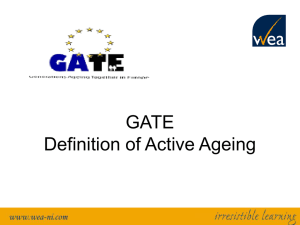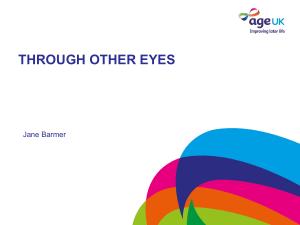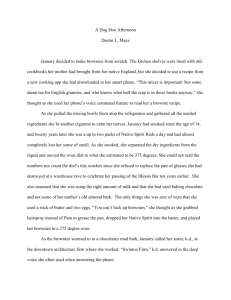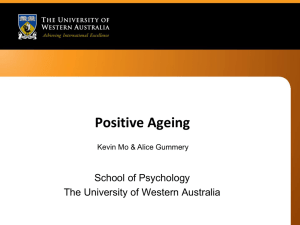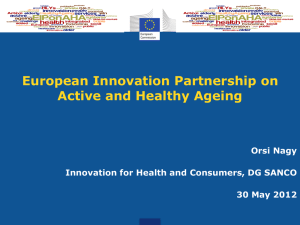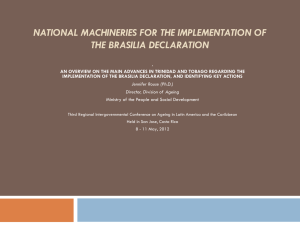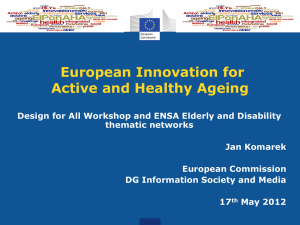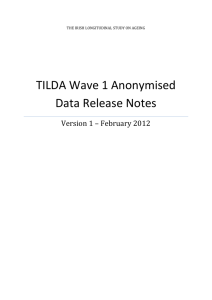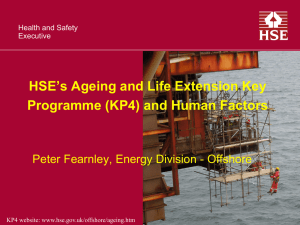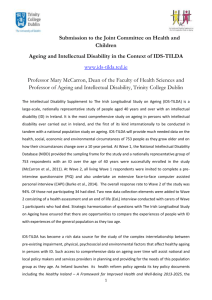Presentation - Charles Normand
advertisement
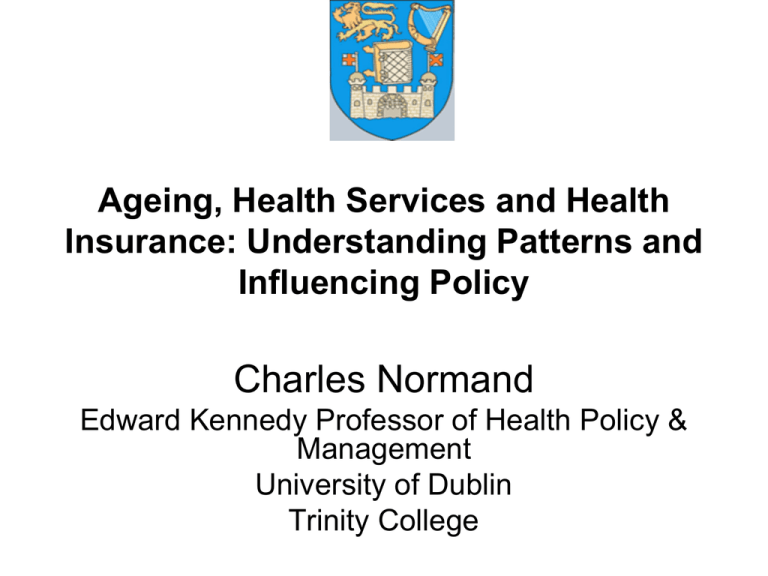
Ageing, Health Services and Health Insurance: Understanding Patterns and Influencing Policy Charles Normand Edward Kennedy Professor of Health Policy & Management University of Dublin Trinity College Outline of Presentation • Funding health services and funding services in Ireland • Patterns of use of health services and social care • Access to and use of health care – age or illness • Using evidence to influence policy on access to care • Universal health insurance, ageing and access to care • Challenges. – ‘Nothing comes from nothing!’ Risk Based Insurance Households Government Income based insurance Flat rate insurance Providers Non-Capital Health Financing in Ireland • Its mainly tax • Insurance is small proportion overall • Insurance is for the old, the rich and the fit. Non-Capital Health Financing in Ireland (1980-2010) Medical card and private health insurance coverage by age Age Group 65-69 70-79 Entitlement Status 50-59 60-64 Medical Card Only Dual Cover Health Insurance Only No Additional Cover Total 24% 5% 52% 19% 100% 31% 9% 51% 10% 100% 32% 17% 42% 10% 100% All Medical Cards All Health Insurance 30% 57% 39% 59% 49% 59% Source TILDA 2011 80+ All 50+ 52% 39% 8% 1% 100% 68% 29% 3% 0% 100% 36% 16% 37% 11% 100% 91% 46% 97% 31% 52% 53% Entitlement Status by Self Rated Physical Health (50+) Self Rated Health Not Covered Medical Card Medical Insurance Total Excellent 15 9 22 14 Very Good 29 22 35 28 Good 35 34 31 33 Fair 17 26 10 19 Poor 3 8 2 6 Source TILDA 2011 Service use • Services are used by sick people • Services are used near the end of life • Both of these are correlated with age, but age in itself is not very important • More people (but lower proportions) are living with a chronic illness (or more than one) • More people (but lower proportions) are living alone • Use and cost of care is higher for people living alone. Percentage who use each service by age Age GP Visit OP Visit ED Visit Hospital Admission 50-59 81 36 14 11 60-69 89 43 15 13 70-79 95 46 17 17 80+ 95 37 15 15 TOTAL 87 40 15 13 Source TILDA 2011 Nights in hospital for those who were admitted by age Age 1-4 % 5-9 % 10-14 % 15-19 % 20-29 % 30-39 % 40+ % 50-59 54 25 9 2 5 2 3 60-69 44 27 15 5 5 1 4 70-79 40 25 14 4 8 3 6 80+ 35 25 16 3 10 5 6 TOTAL 45 27 12 3 7 3 4 Source TILDA 2011 Percentage of those in POOR HEALTH who use each service by age Age GP Visit OP Visit ED Visit Hospital Admission 50-59 94 61 29 23 60-69 96 64 25 24 70-79 98 64 27 27 80+ 96 45 22 25 TOTAL 96 61 26 25 Source TILDA 2011 Percentage who use community and social services by age 50+ Service 50-59 60-69 70-79 80+ Total PH Nurse 2.2 3.7 11.8 24.9 6.6 OT 0.9 1.3 2.2 3.2 1.5 Chiropody 1.3 2.2 9.8 15.6 4.5 Physio 3.9 5.1 7 6.9 5.2 Home help 0.5 1.3 6.2 19.9 3.5 Meals on W 0.1 0.3 2.4 3.3 0.9 Day care 0.3 0.6 1.6 6.8 1.2 Source TILDA 2011 Access to health care – ageism or good clinical practice? 1 • Unpublished Canadian data suggest some of each • There are good reasons for not providing services where co-morbidity and limited capacity to benefit make an intervention less useful • Some evidence that some older people choose not to have some treatments. Access to health care – ageism or good clinical practice? 2 • However access to useful treatment is often not offered • Study of dialysis in 80+ showed good outcomes and better QOL than for younger people – those who were otherwise well did well, those who had multiple health problems did badly • Key issue to shift away from age as criterion for rationing or setting priorities. Access to health care – ageism or good clinical practice? 3 • Unpublished Scottish data suggest access to potentially life extending treatments continue but QOL enhancing ones do not neat the end of life (cf CABG and Cataract) • Most growth in service demand reflects more use by older people and not more older people – growing expectations are more important than ageing in driving increases in demands for services. Using evidence to influence policy on access to care • Ageing per se is not a large driver of increasing health care costs, but will lead to significant rises in needs for community and social care • Converging life expectancy of men and women is tending to reduce the growth in costs of care • Evidence from TILDA shows that older people are a major resource for caring for older and younger people • Evidence from TILDA suggests that use of services is affected by medical card and insurance status. Universal health insurance, ageing and access to care 1 • UHI is a mechanism not a policy – the policy is the U and how U is the insurance is the question • UHI can be associated with increases (or decreases) in efficiency, so can allow more for less • Overall burden of paying will still fall on households, but distribution of burden may change • Defining the benefit package is still the big challenge • Diversity and choice may come at the expense of universalism and equity. Universal health insurance, ageing and access to care 2 • Current private insurance redistributes from well to sick • Poorer younger insured subsidise older richer ones • Community rating rules protect many, but also exclude many – poorer working people could afford normal health insurance but cannot afford community rated insurance • The advantage of UHI is the transparency of funding, but does not guarantee better access. Universal health insurance, ageing and access to care 3 Compared to present system: • 60% of those over 80 should see better access to hospital care, and 3% to GP care • 41% of those 70-79 will see improved access to hospital care and 9% to GP care • 43% of those in their 50s will see better access to hospital care and 70% to GP care. Challenges • Making chronic disease management across all levels of care a reality • Shifting care closer to users where feasible and to specialised providers when necessary • Removing perverse incentives to patients and providers for wasteful use of services • Accepting that rationing is inevitable and necessary and must be done fairly • Recognising options and choices are complex. End Thank you for your attention
